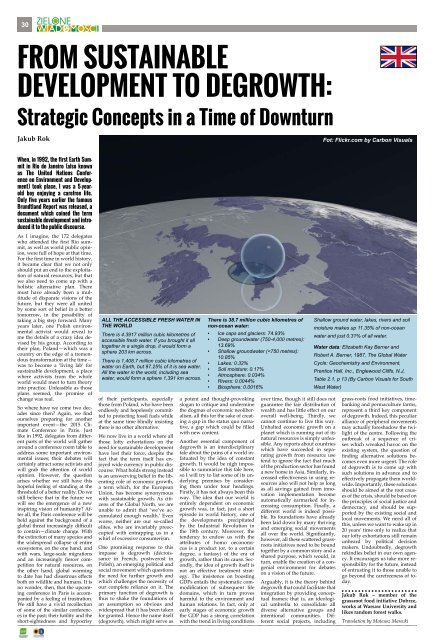Zmiany klimatu
1UWPC73
1UWPC73
Create successful ePaper yourself
Turn your PDF publications into a flip-book with our unique Google optimized e-Paper software.
30<br />
From Sustainable<br />
Development to Degrowth:<br />
Strategic Concepts in a Time of Downturn<br />
Jakub Rok<br />
Fot: Flickr.com by Carbon Visuals<br />
When, in 1992, the first Earth Summit<br />
in Rio de Janeiro (also known<br />
as The United Nations Conference<br />
on Environment and Development)<br />
took place, I was a 5-yearold<br />
boy enjoying a carefree life.<br />
Only five years earlier the famous<br />
Brundtland Report was released, a<br />
document which coined the term<br />
sustainable development and introduced<br />
it to the public discourse.<br />
As I imagine, the 172 delegates<br />
who attended the first Rio summit,<br />
as well as world public opinion,<br />
were full of hope at that time.<br />
For the first time in world history,<br />
it became clear that we not only<br />
should put an end to the exploitation<br />
of natural resources, but that<br />
we also need to come up with a<br />
holistic alternative plan. There<br />
must have already been a multitude<br />
of disparate visions of the<br />
future, but they were all united<br />
by some sort of belief in a better<br />
tomorrow, in the possibility of<br />
taking a big step forward. Many<br />
years later, one Polish environmental<br />
activist would reveal to<br />
me the details of a crazy idea devised<br />
by his group. According to<br />
their plan, Poland—which was a<br />
country on the edge of a tremendous<br />
transformation at the time—<br />
was to become a ‘living lab’ for<br />
sustainable development, a place<br />
where activists from the whole<br />
world would meet to turn theory<br />
into practice. Unfeasible as those<br />
plans seemed, the promise of<br />
change was real.<br />
So where have we come two decades<br />
since then? Again, we find<br />
ourselves preparing for another<br />
important event—the 2015 Climate<br />
Conference in Paris. Just<br />
like in 1992, delegates from different<br />
parts of the world will gather<br />
around a conference room table to<br />
address some important environmental<br />
issues; their debates will<br />
certainly attract some activists and<br />
will grab the attention of world<br />
opinion. However, the question<br />
arises whether we still have this<br />
hopeful feeling of standing at the<br />
threshold of a better reality. Do we<br />
still believe that in the future we<br />
will see the emergence of a new<br />
inspiring vision of humanity? After<br />
all, the Paris conference will be<br />
held against the background of a<br />
global threat increasingly difficult<br />
to contain—climate change. With<br />
the extinction of many species and<br />
the widespread collapse of entire<br />
ecosystems, on the one hand, and<br />
with wars, large-scale migrations<br />
and an increasingly fiercer competition<br />
for natural resources, on<br />
the other hand, global warming<br />
to date has had disastrous effects<br />
both on wildlife and humans. It is<br />
no wonder, then, that the upcoming<br />
conference in Paris is accompanied<br />
by a feeling of frustration.<br />
We still have a vivid recollection<br />
of some of the similar conferences<br />
in the past; their futility and the<br />
short-sightedness and hypocrisy<br />
All the accessible fresh water in<br />
the world<br />
There is 4.3917 million cubic kilometres of<br />
accessible fresh water. If you brought it all<br />
together in a single drop, it would form a<br />
sphere 203 km across.<br />
There is 1,408.7 million cubic kilometres of<br />
water on Earth, but 97.25% of it is sea water.<br />
All the water in the world, including sea<br />
water, would form a sphere 1,391 km across.<br />
of their participants, especially<br />
those from Poland, who have been<br />
endlessly and hopelessly committed<br />
to protecting fossil fuels while<br />
at the same time blindly insisting<br />
there is no other alternative.<br />
We now live in a world where all<br />
those lofty exhortations on the<br />
need for sustainable development<br />
have lost their force, despite the<br />
fact that the term itself has enjoyed<br />
wide currency in public discourse.<br />
What holds strong instead<br />
is an unswerving belief in the liberating<br />
role of economic growth,<br />
a term which, for the European<br />
Union, has become synonymous<br />
with sustainable growth. As citizens<br />
of the Global North, we are<br />
unable to admit that ‘we’ve accumulated<br />
enough wealth.’ Even<br />
worse, neither are our so-called<br />
elites, who are invariably preoccupied<br />
with entrapping us in a<br />
whirl of excessive consumerism.<br />
One promising response to this<br />
impasse is degrowth (décroissance<br />
in French, postwzrost in<br />
Polish), an emerging political and<br />
social movement which questions<br />
the need for further growth and<br />
which challenges the necessity of<br />
our complete reliance on it. The<br />
primary function of degrowth is<br />
thus to shake the foundations of<br />
an assumption so obvious and<br />
widespread that it has been taken<br />
for granted. Hence the name itself<br />
(degrowth), which might serve as<br />
There is 38.7 million cubic kilometres of<br />
non-ocean water:<br />
• Ice caps and glaciers: 74.93%<br />
• Deep groundwater (750-4,000 metres):<br />
13.69%<br />
• Shallow groundwater (


